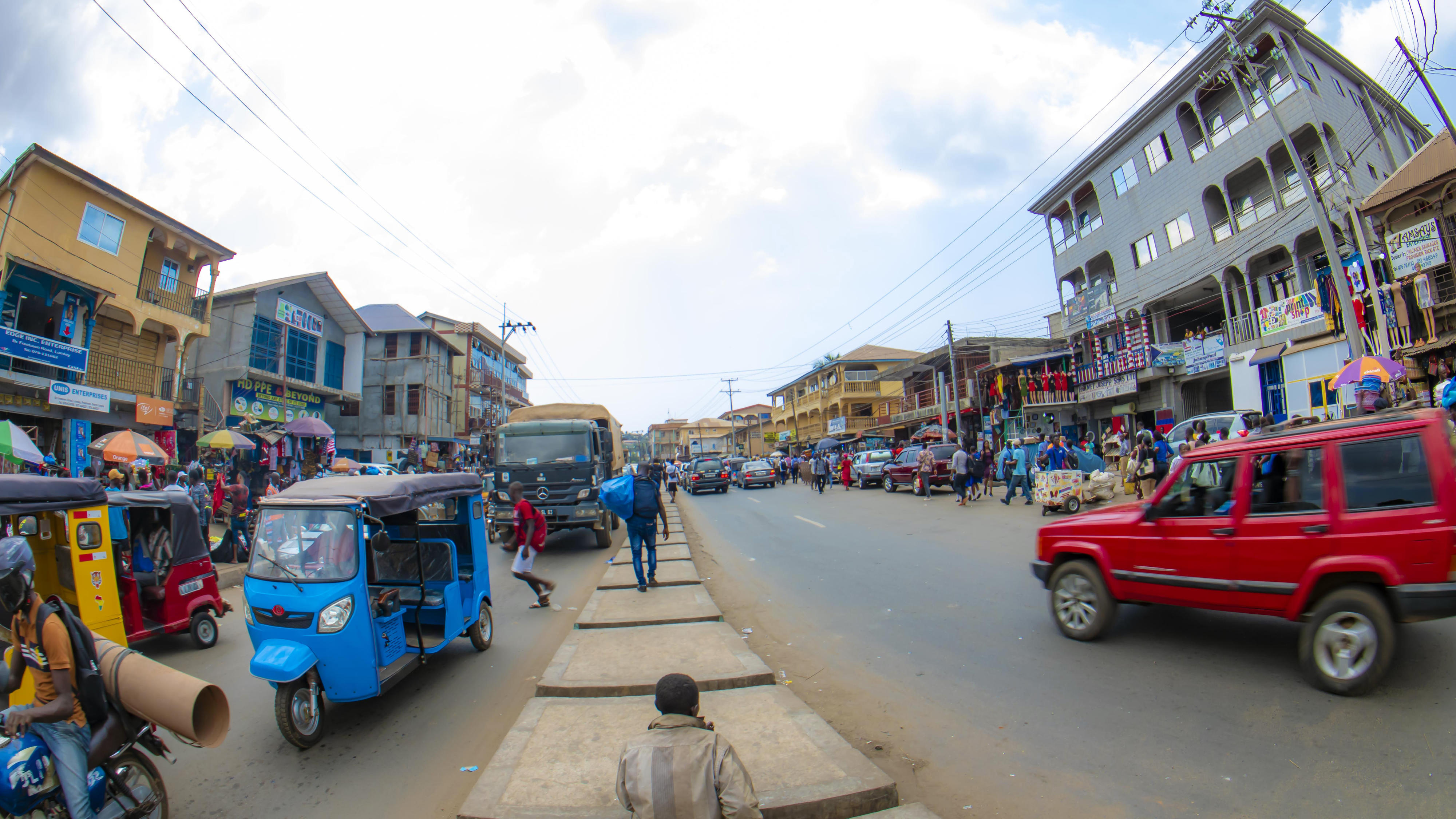Street scene in Freetown, Sierra Leone
Copyright© Victor turay, via Wikimedia, CC BY-SA 4.0 DEED
Political situation Intended reforms only possible with international support
Despite setbacks caused by the COVID-19 pandemic, President Julius Maada Bio has been trying to continue with his ambitious government programme. Key projects include free universal education and healthcare, combating corruption, creating jobs, promoting private investment, reforming land rights and promoting gender equality.
Small signs of progress are visible, but overall the reforms are proceeding slowly and so far they have not brought sufficient improvements for the population.
The government’s future development goals are summed up in the Medium Term National Development Plan 2024-2030; the central elements of the Plan are food security, employment and investing in people.
Obstacles to the country’s development include widespread corruption, low education levels and the extremely challenging financial and economic situation. In order to be able to implement its reform programme, the government of Sierra Leone is reliant on extensive external support. Government revenue is not sufficient to meet the basic needs of the population.
Within the bounds of its limited scope as a country of around 8.6 million, Sierra Leone has an active foreign policy. Sierra Leone supports efforts towards regional integration in Africa (including in the Economic Community of West African States, ECOWAS), represents Africa’s interests within the United Nations (UN), and engages in conflict prevention and peacekeeping activities. Since June 2025, President Bio has been the political chair of ECOWAS and in this role has been working to foster dialogue in the region. The government is concerned by the increasing religious fanaticism and terrorism emerging in West Africa. Sierra Leone is committed to promoting the peaceful coexistence of different religions.
Human rights
The human rights situation in Sierra Leone is increasingly unsatisfactory. There are deficits with regard to freedom of opinion, freedom of assembly and media freedom, and also when it comes to protection against arbitrary actions by the state, and protecting the rights of women, children and minorities. The 2025 World Press Freedom Index compiled by the non-governmental organisation Reporters Without Borders ranked Sierra Leone in 56th place out of 180 countries evaluated.
Positive developments in terms of human rights are the abolition of the criminal libel law, which restricted press freedom, and the ending of the ban on pregnant girls attending school. In July 2021, the parliament also passed a unanimous vote to abolish the death penalty.
There are, however, still major deficiencies in the area of women’s rights. Many women and girls in Sierra Leone are still subject to female genital mutilation, and domestic violence – primarily against female household members – is widespread. The constitution explicitly allows violations of the non-discrimination principle based on religion or customary law. One positive development is the adoption in August 2022 of the Customary Land Rights Act, which is meant to strengthen the ownership rights of women and girls. Until now, they were de facto excluded from inheriting. The most important achievement in this context was the passing in June 2024 of a ban on underage marriage.
Organised civil society is mainly to be found in larger cities. There, it plays an active political role. In rural regions, traditional authorities are the most important decision-makers.
Background The civil war in Sierra Leone (1991–2002)
Corruption, mismanagement, a select few profiting from the country’s natural resources while the majority of the population lived in poverty, widespread unemployment and a lack of prospects for young people, poor-quality education and healthcare systems and an unfair distribution of land were all factors that contributed to the Revolutionary United Front (RUF) launching an armed rebellion against the government of Sierra Leone in 1991. Political and social motives soon took a back seat, however, and the RUF began fighting primarily to retain power and – with the backing of neighbouring Liberia – to gain more influence over the illegal trade in rough diamonds. The civil war was shockingly brutal, with massive human rights violations.
The rebels signed a peace agreement with the government in July 1999, but this was not immediately adhered to. An official end to the civil war was declared in January 2002. An extensive UN peacekeeping mission (UNAMSIL) helped the government to disarm fighters and reintegrate them into society. A Truth and Reconciliation Commission was established to investigate and address the crimes committed. Its final report (External link) contains numerous suggestions for reforms to help combat the causes of the conflict. They have been only partially implemented thus far.
The main perpetrators were also prosecuted through the Special Court for Sierra Leone (External link) (SCSL). The court gave nine defendants prison sentences of between 15 and 52 years. Among those prosecuted was the former President of Liberia, Charles Taylor, who was found guilty of war crimes and crimes against humanity and sentenced to 50 years in prison.
The SCSL is the first international tribunal to issue sentences for the deployment of child soldiers, and to recognise forced marriage as a crime against humanity and rape as a war crime.
As at: 21/01/2026
